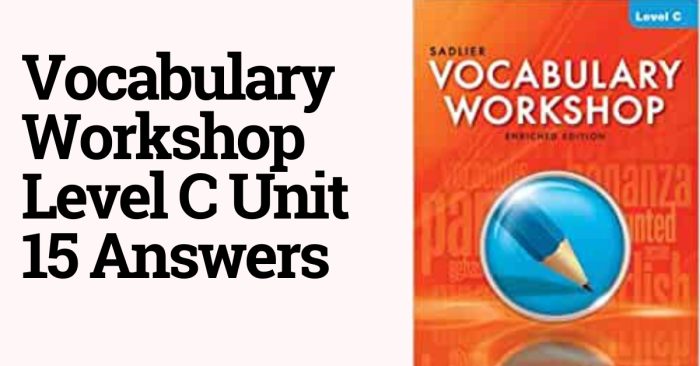Level c unit 6 choosing the right word – Embark on an exploration of Level C Unit 6: Choosing the Right Word, a journey that unveils the intricacies of effective word selection. This comprehensive guide delves into the impact of word choice on communication, empowering you to convey your thoughts with precision, clarity, and persuasiveness.
Throughout this discourse, we will examine the process of identifying potential word choices, evaluating their appropriateness, and making informed decisions based on context, audience, and purpose. By embracing the principles Artikeld here, you will elevate your communication skills and leave a lasting impression on your readers.
1. Understanding the Context of Word Choice: Level C Unit 6 Choosing The Right Word

Choosing the right words is crucial for effective communication. Words convey not only information but also tone, clarity, and persuasiveness. The context in which words are used significantly impacts their meaning and impact.
For example, the word “happy” can express a range of emotions, from mild contentment to intense joy. In a professional setting, using “happy” to describe a minor accomplishment may be appropriate, while in a personal letter, “ecstatic” or “elated” might better convey the intensity of the emotion.
Identifying Word Options, Level c unit 6 choosing the right word
Identifying potential word choices involves understanding the context, purpose, and audience of the communication. Dictionaries, thesauruses, and other resources can expand vocabulary and provide alternative options.
Brainstorming and generating word options is an iterative process. Start with a broad search and gradually refine the options based on the specific context.
Evaluating Word Choices
Evaluating word choices involves considering factors such as accuracy, precision, formality, and style. Accuracy ensures that the words convey the intended meaning, while precision ensures that they convey it without ambiguity.
Formality refers to the level of formality appropriate for the context, and style refers to the overall tone and approach of the communication.
Making Informed Word Choices
Making informed word choices requires considering the context, audience, and purpose of the communication. Cultural sensitivity and bias should also be taken into account to ensure that the words used are respectful and inclusive.
By following these guidelines, individuals can make informed and effective word choices that enhance communication and achieve their desired outcomes.
Questions and Answers
What is the significance of word choice in communication?
Word choice is paramount in communication as it shapes the tone, clarity, and persuasiveness of your message. The words you select can convey different meanings and emotions, influencing the impact of your communication on the audience.
How can I expand my vocabulary to enhance my word choice?
Expanding your vocabulary is crucial for effective word choice. Utilize dictionaries, thesauruses, and online resources to discover new words and their meanings. Engage in reading and writing exercises to familiarize yourself with diverse word usage.
What factors should I consider when evaluating word choices?
When evaluating word choices, consider factors such as accuracy, precision, formality, and style. Ensure that the words you select convey the intended meaning clearly and appropriately for the context and audience.
